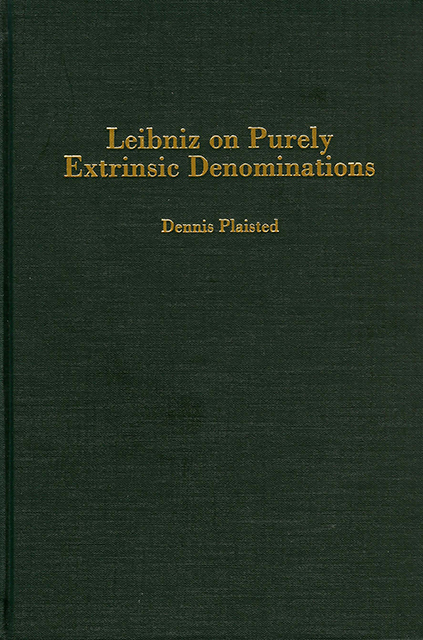Book contents
- Frontmatter
- Dedication
- Contents
- Acknowledgments
- Introduction
- Chapter One Two Views of Purely Extrinsic Denominations
- Chapter Two Truth and Purely Extrinsic Denominations
- Chapter Three Extrinsic Denominations and Where Accidents Are Allowed to Put Their Feet
- Chapter Four Extrinsic Denominations and the Interconnection of All Things
- Chapter Five Extrinsic Denominations and the Foundations of Relations
- Chapter Six Extrinsic Denominations and the Claim that Every Monad Expresses the Universe
- Appendix A Critique of Massimo Mugnai’s Version of NPE
- References
- Abbreviations
- Notes
- Index
Chapter Two - Truth and Purely Extrinsic Denominations
Published online by Cambridge University Press: 25 March 2023
- Frontmatter
- Dedication
- Contents
- Acknowledgments
- Introduction
- Chapter One Two Views of Purely Extrinsic Denominations
- Chapter Two Truth and Purely Extrinsic Denominations
- Chapter Three Extrinsic Denominations and Where Accidents Are Allowed to Put Their Feet
- Chapter Four Extrinsic Denominations and the Interconnection of All Things
- Chapter Five Extrinsic Denominations and the Foundations of Relations
- Chapter Six Extrinsic Denominations and the Claim that Every Monad Expresses the Universe
- Appendix A Critique of Massimo Mugnai’s Version of NPE
- References
- Abbreviations
- Notes
- Index
Summary
I. Introduction
One of Leibniz’s most important doctrines—perhaps the most important—is his predicate-in-subject theory of truth (hereafter referred to as PS). His PS principle can be stated as follows:
(7) A proposition is true if and only if its predicate concept is included in its subject concept.
One concept’s inclusion in another is a technical notion in Leibniz’s philosophy. I shall have much more to say about Leibniz’s notion of concept-inclusion in chapter three, but for now I will merely note that with regard to a predicate concept’s inclusion in a subject concept, Leibniz says that
The subject-term, therefore, must always include the predicate-term, in such a way that a man who understood the notion of the subject perfectly would also judge that the predicate belongs to it.
So, if a predicate is included in a subject, then the predicate will be part of the very idea of the subject; it will not be possible to conceive of the subject completely without also conceiving the predicate. There are many fascinating issues surrounding Leibniz’s PS doctrine of truth, such as whether, despite his pronouncements to the contrary, all true propositions become necessary truths if PS is accepted. However, the concern at present is how best to render his argument that because of PS, there are no purely extrinsic denominations. I will first offer a reconstruction of the argument with its conclusion interpreted as (6), and then I will offer a reconstruction of the argument with its conclusion read reductionistically. I maintain that reflection on the PS principle applied to propositions whose predicate concepts are extrinsic denominations straightforwardly implies that extrinsic denominations are in the subjects of which they are predicated, which is essentially what (6) maintains. I then argue that the reductionist version of NPE can provide at best an awkward and textually implausible reconstruction of the PS argument. Central to the reductionist reconstruction is a claim that the PS principle does not apply to propositions having extrinsic denominations as predicates. Some reductionists accept this claim on the ground that Leibniz did not regard extrinsic denominations as genuine predicates. Others seem to believe that Leibniz did regard extrinsic denominations as predicates, just not the sort of predicates to which PS can apply.
- Type
- Chapter
- Information
- Leibniz on Purely Extrinsic Denominations , pp. 13 - 34Publisher: Boydell & BrewerPrint publication year: 2002



